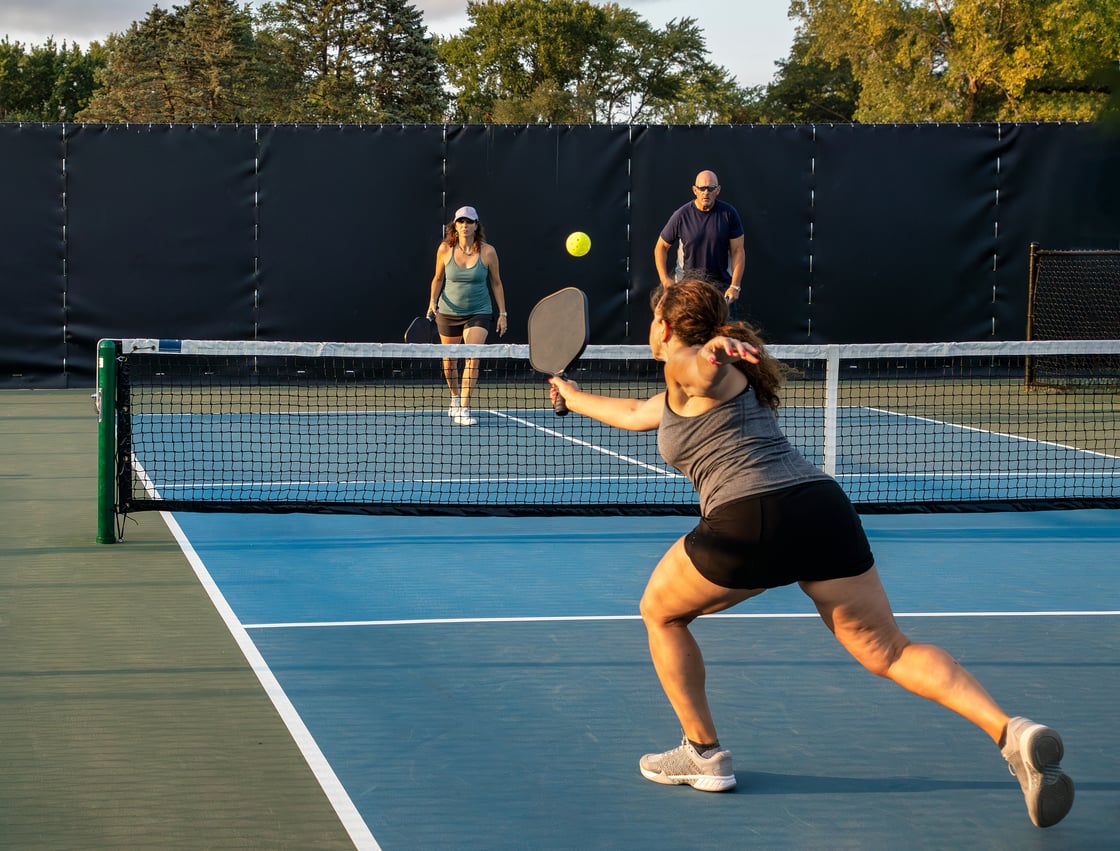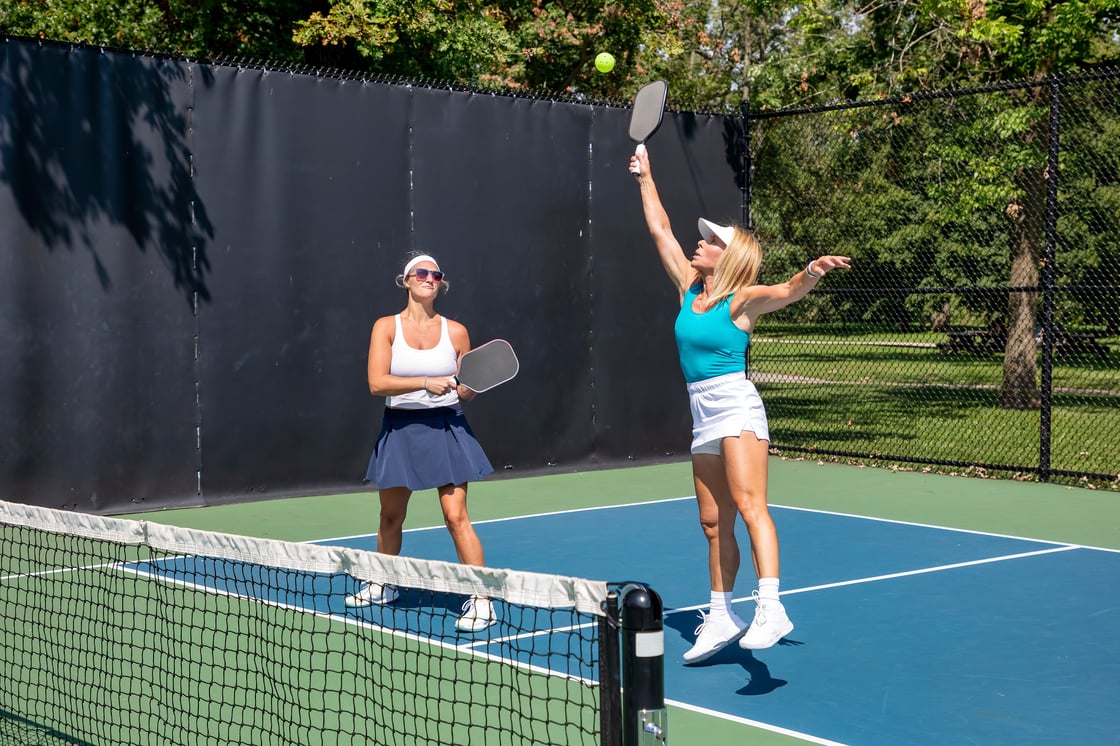There are some hilarious videos out there about the 5 Stages of Pickleball, poking fun at the addiction so many people have developed for this sport.
From my experience as a player, coach, and industry professional, I’ve seen people go through these stages firsthand.
Here is my own version of the “stages of pickleball”, from a personal perspective...
Stage One: Discovery
Your initial exposure can come in various different ways: stumbling upon it through social media, a sports class, or maybe you were encouraged to try it by someone in your life.
It’s such a rapidly growing and popular sport that when someone you know becomes enthusiastic about it, they can’t help but talk about it, making it increasingly appealing for you to give it a shot.
While this wasn’t how I entered pickleball, I’ve witnessed it time and again with others. As a coach, I frequently hear people say, “my _______ told me to try it, so here I am.”
Then, after their first few games, the follow-up is usually “this was a lot of fun,” sparking their curiosity about the sport.
This initial excitement is the gateway to deeper engagement, as players start to explore the game’s nuances and become eager to learn more. At this point, they have no idea what’s really about to hit them!
For me, this happened quickly and swiftly. I was shown how to play pickleball by a small group of lovely seniors at a recreation center.
After two one hour sessions I was asked to give up my spot for a senior, as it was a senior pickleball time slot. I would say that I was pushed out of the nest pretty fast, but that allowed me to jump into the second stage.
Stage Two: Information Exploration
This is an equally exciting moment alongside the “discovery” stage, with the main difference being that this stage can become almost a case of information overload.
Now comes the endless rabbit holes on YouTube, retail websites, and discussion forums on social media, as you try to gather as much information as possible.
Here is where I often hear, “I can’t believe pickleball has been around for so long—I only just heard of it a few years ago,” or “It got popular because of COVID-19, right?”
In this stage, people tend to play more pickleball in a condensed amount of time than anyone should engage in.
The time between stages one and two may be longer for some and shorter for others; it depends on how quickly you accelerate through the learning process to playing games without needing guidance on scoring or basic rules.
Also during this stage, I find that people discover what type of player they naturally are, identify their strengths and weaknesses, and find their pickleball crew.
They begin to realize and accept that pickleball is life-changing, all-consuming, and a full-on addiction.
I think that the lifespan of this stage is long. Speaking for myself, the short answer is that stage two lasted for years.
I went through all the same experiences that many others have: I like pickleball, I love pickleball, I want to compete in pickleball, and I want to find work in the sport—how am I going to make that happen?
The long and complicated answer is all of that, plus the realization that I will probably never grow out of stage two.
I will always be challenging myself to learn more about this sport, research, and collect information, while staying up-to-date with industry trends and standards.
I have always liked to maintain a wide range of knowledge about the game—from equipment to the pro tours, competitions, emerging companies, talent, and more—and I want to share that knowledge in many different ways as well.

Stage Three: Experiencing and Accepting the Challenges of Pickleball
This is the less enjoyable stage, but it’s a necessary part of the process. Pickleball can only be engaging for so long; some players experience this for a shorter or longer period.
A stagnation in progress can take various forms, including skill-based, inspirational, and physical hurdles. For some, an injury might halt their advancement through stage two, while others may find themselves dealing with developmental plateaus.
As players navigate stage two, this stage often overlaps. Whatever interrupts their momentum leads to reflection on how the sport has impacted their lives.
Some players recognize their ongoing passion for pickleball despite its challenges, while others may become disenchanted. Unfortunately, I’ve often witnessed some finding their enjoyment waning due to politics, drama, and complexities within the game.
When players hit a point of stagnation and struggle to move past it, they often enjoy pickleball less than they did initially. At some point, people who play 5+ days a week for hours at a time will burn out one way or another.
One of the strengths of pickleball is how accessible it is; many people have a natural ability to play, which contributes to its rapid growth. However, when that ability stalls, feelings of discouragement can hinder a player’s development, particularly when combined with their previous experiences in sports—or a lack thereof.
From my perspective, this stage has its challenges. The more involved I become in pickleball, the more significant the hurdles.
As participation grows, it requires greater effort from all of us to continue improving and showing up consistently. This stage can be difficult, but how you navigate it and manage the challenges really does determine your longevity in the sport.

Stage Four: Branching Out
The best way to break free from the cycle of stage three is to expand your circle. This is relatively easy, given how quickly pickleball is growing.
There are countless opportunities emerging in the pickleball industry, and it’s incredible to see new possibilities every day.
This might mean trying out a new facility, challenging yourself with a pickleball camp or competition, or even incorporating pickleball into a vacation. If you’ve been hitting roadblocks in the sport, step four is all about changing things up.
Take some time to reflect on what you want from pickleball. It can be as simple as playing 1-2 times a week with friends and family or joining a club that offers the sport.
Alternatively, you can follow in my complicated footsteps and dive headfirst into the expansive world of a sport that is growing faster than anything else right now.
I branched out by revisiting the reasons I fell in love with pickleball. I spent an entire summer playing with friends who were at many levels below me. In the process, I sacrificed certain competitive aspects but gained so much more from the game.
I was reminded of what makes pickleball so amazing and relearned why others are drawn to it, too. Yes, I still crave and miss the opportunities to play at the highest level, but I don’t think that those opportunities are going anywhere, and neither am I.
When I’m ready to dive back into high-level competition, I will be there.
Last year, at the US Open I chose to travel with different players than I usually do, struck a new partnership, and having practiced only twice together leading up to it, we walked away with a silver medal after over five hours of competition.
Experience never leaves you, and when you dig deep for it, you can always level up in pickleball.
Stage Five: Defining Your Role
This stage can mean different things for each of you. You might not know what your “role” is for some time, but each interaction on the court will help shape your understanding.
There’s a local public court near me that attracts some challenging attitudes. Some players aren’t willing to share the space, while others approach the game with a tennis mindset, uninterested in learning the strategies unique to pickleball.
After playing there a few times, I can confidently say I won’t be returning. It’s not my place to educate those unwilling to learn about the etiquette of pickleball.
Instead, I want to focus on creating more opportunities for people who want to be part of a welcoming community and are interested in improving their game as the sport evolves.
My role is to share my knowledge and enthusiasm for the game. I aim to build strong relationships within the sport and develop my local club into a leader in the Toronto pickleball community.
The people I connect with along the way will be those who appreciate the game for what it is and are committed to improving their skills while helping others enjoy the sport. That is more than enough for me.
This article was taken from our 'Control the Kitchen' Newsletter, if you're interested in receiving more content like this, please feel free to sign up using the subscribe section located at the bottom left of this page (or underneath the article if you're on mobile), thanks!